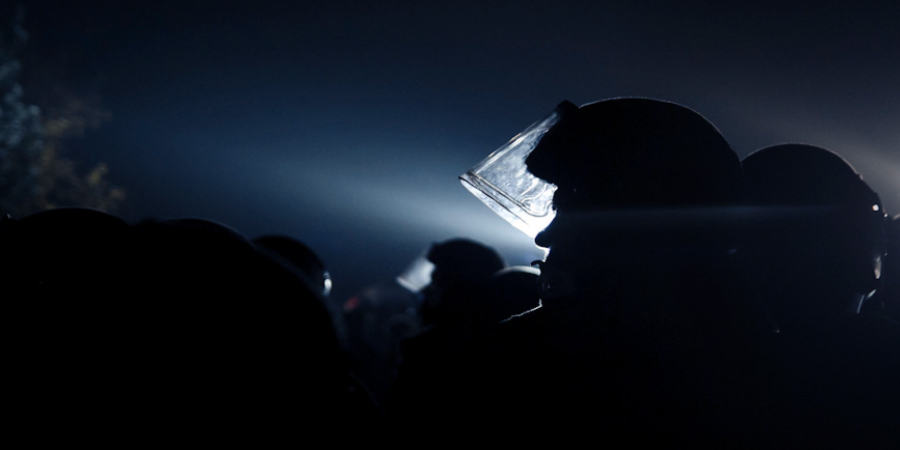Who Really Benefits From Banning White Supremacist Groups?
Bans targeting white supremacist organizations are increasing around the world. Germany's experience demonstrates how these bans can backfire.

Editor’s Note: As the United States and other countries consider more bans on right-wing terrorist organizations, they would do well to consider the experience of Germany, which has long banned right-wing groups. Anna Meier of the University of Nottingham argues that the German effort is ineffective. Not only does white supremacist violence in Germany remain high, but the bans often empower police forces with racist leanings and otherwise bolster structural forces that target minority communities.
Daniel Byman
***
Earlier this year, New Zealand designated U.S.-based groups The Base and Proud Boys as terrorist organizations. These designations are the latest in a spate of white supremacist groups being added to official terrorist lists: Australia made its first white supremacist designation in November 2021, and Canada issued six designations in 2021 alone. Historically, however, white supremacist terrorist designations are rare, with the first often dated by scholars to just six years ago, when the United Kingdom banned the neo-Nazi group National Action. It is therefore difficult to assess whether designation as a counterterrorism mechanism is effective against white supremacists, despite increasing enthusiasm for its usage.
With consequences ranging from financial sanctions and restrictions on propaganda to full-blown criminalization of membership, designation is a complex mechanism, and what it looks like in practice varies from country to country. Moreover, designation can have serious knock-on effects for aid organizations, asylum-seekers, researchers, and conflict mediators. Likewise, research suggests that designation can also embolden and offer legitimacy to the very organizations it seeks to hamper. The question of efficacy in the case of white supremacists is therefore crucial.
My research on counterterrorism in Germany, which has had mechanisms for designating groups since after World War II, offers many insights into the long-term effects of organizational bans. Unfortunately, the prognosis is not positive. Germany’s 87 bans on non-state white supremacist organizations have not diminished white supremacist activity in the country. In fact, such bans may have inadvertently strengthened the underlying ideology of white supremacy itself by reinforcing the structural white supremacy of the national security apparatus. The German case suggests that the truly crucial question is perhaps not whether white supremacist designations “work” but, rather, for whom do they work.
The Limits of White Supremacist Bans in Germany
Since 1951, Germany has banned white supremacist organizations under a legal mechanism called the Vereinsgesetz (Associations Law). The Vereinsgesetz allows legally defined “associations” to be banned if they are found to oppose the “constitutional order”—an act that constitutes using or supporting the use of violence against others. Calling for the overthrow of the German state, for example, is legally classifiable as anti-constitutional. Committing or calling for attacks against marginalized communities—a category that in Germany is often understood as synonymous with individuals with a “migration background” (Migrationshintergrund), which carries connotations of “nonwhite”—also makes organizations eligible for banning. Banned organizations have their assets seized by the state, and any individual who uses the symbols of a banned organization or tries to form a successor organization may be subject to criminal prosecution.
The Vereinsgesetz does not designate terrorist organizations per se, but it shares numerous similarities with terrorist designation mechanisms in other countries. Most notably, it is often used against the same organizations deemed “terrorist” elsewhere. Blood & Honour and Combat 18, two white supremacist organizations designated in the United Kingdom and Canada, respectively, are banned as anti-constitutional in Germany. Likewise, the Islamic State and other Islamist fundamentalist actors considered “terrorist” under the law elsewhere are targeted in Germany via the Vereinsgesetz. The Vereinsgesetz, then, operates within the same conceptual and narrative universe as terrorist designation mechanisms in terms of classifying violence as illegitimate in the eyes of the state.
At the time of writing, 87 white supremacist organizations and one white supremacist political party are banned under the Vereinsgesetz—far more white supremacist bans than in any other country under any mechanism. (Canada, with the second-highest number of white supremacist bans, has just eight.) Despite the extent of these bans, however, white supremacist violence remains a serious problem in Germany. On her first day in office, Interior Minister Nancy Faeser declared right-wing extremism the “greatest threat to [German] democracy.” In 2021 alone, the Federal Office for the Protection of the Constitution reported 945 acts of “right-wing extremist violence” and identified 13,500 “violent right-wing extremists” living in the country. The most recent mass-casualty event, two shootings at shisha bars in Hanau in 2020, killed 11 people. A litany of police failures in Germany’s most high-profile white supremacist case of the 21st century, that of the National Socialist Underground (NSU), illustrate the inadequacies of Germany’s approach, which range from anti-Turkish racism to the choice to protect confidential informants over public safety. Such widespread violence and institutional failure is not a sign of a country that has its white supremacist problem under control.
How is this possible? The Vereinsgesetz describes as anti-constitutional organizations that threaten the “peaceful coexistence” of different communities. Yet bans can themselves threaten that peace by empowering organizations, such as police, that historically target minoritized communities in Germany. These cases of police racism highlight white supremacy as an institutional problem, not simply the purview of non-state actors. A 2020 report found 370 cases of suspected right-wing extremism in German police forces. Many of these cases involve officers creating or participating in far-right online spaces, including 29 officers in the northern state of North Rhine-Westphalia (NRW) who were suspended for sharing neo-Nazi images in WhatsApp groups in September 2020. Just a few years prior, NRW had ramped up its activities against the far right, with minimal long-term results.
In August 2012, NRW Interior Minister Ralf Jäger announced bans on three white supremacist organizations. Along with a fourth ban that June, these were the first uses of the Vereinsgesetz in NRW in 30 years. As part of these bans, around 900 police officers staged raids on private residences and meeting spaces in 32 cities—a massive coordinated operation that reinforced state support for large operations. Such raids then became more common in the years that followed, with police partnering with customs and immigration enforcement to target minoritized communities in cities deemed unfriendly toward police. NRW is not an isolated example: Police in Baden-Württemberg received increased resources to target the far right after the banning of the neo-Nazi Autonome Nationalisten Göppingen in 2014, the first ban in the state in 30 years. But this increased police power was then subsequently used to target African asylum-seekers in massive raids, such as in the town of Ellwangen in 2018, after they protested deportations. Baden-Württemberg was one of just two German provinces in which police refused to take part in a national study about racism and prejudice in law enforcement in 2022.
In short, white supremacist bans emboldened police to go after the very communities most needing protection from white supremacists. Coupled with the rampant neo-Nazi problem in German police forces, including in NRW and Baden-Württemberg, this elevation of police power calls into question its efficacy as a tool for targeting white supremacy.
Nor did the bans meaningfully address non-state white supremacist activity in NRW. Shortly after being banned, members of four neo-Nazi networks reconstituted themselves as a new group, Die Rechte (“The Right”). Die Rechte was formally recognized as a political party by the NRW government and continues to exist. In 2022, 10 years after Die Rechte’s predecessors were banned, anti-fascists rallied in Dortmund, NRW, to call attention to the paradox of bans that strengthened the very neo-Nazis they were targeting. At best, then, the Vereinsgesetz offers a cautionary tale for other countries considering more extensive white supremacist proscription.
Who Do Bans Protect?
More fundamentally, the Vereinsgesetz, and conversations around it, underscore a persistent separation in both law and public discourse between non-state white supremacist actors and structural white supremacy. Rather than framing bans as protecting the communities of color most frequently targeted by white supremacist militancy, they are instead presented as preserving democracy. Indeed, in Germany, the Vereinsgesetz grew out of the philosophy of “militant democracy,” whereby the protection of democracy is deemed so important that occasional anti-democratic practices are seen as justifiable. Analyses of the Vereinsgesetz’s efficacy, and controversies over its use, center possible violations to freedom of expression. Structural violence done through the tolerance of white supremacists in the public sphere, especially when viewed in comparison to treatment of groups advocating liberation for other racialized groups, remains largely absent from the conversation. In other words, the banning of white supremacists is viewed in Germany as a potential problem not because of inefficacy or potentially negative side effects for vulnerable Germans, but because white supremacists being banned from vocalizing their racist beliefs publicly is a potential violation of democracy.
The question is not whether banning white supremacists is anti-democratic—all democratic states have restrictions, de facto or de jure, on political speech and activity. Rather, the question is why the issue of (anti)democracy focuses on a particular set of legal rights over another. The rights of marginalized communities to exist safely, and by extension to participate fully in the public sphere, are certainly limited by free-ranging white supremacist militancy. But they are also circumscribed by measures targeting that militancy, as the case of police empowerment in NRW shows. If bans in practice endanger the targets of white supremacist militancy through empowering structurally white supremacist security institutions, then they reveal the limited nature of democracy in countries like Germany for the most vulnerable members of society, whose safety does not register as either a security concern or a necessary component of democracy. Put differently, they reveal, and perpetuate, structural white supremacy in the name of fighting a subset of white supremacist activity.
It is possible, in a counterfactual world, that white supremacist violence would be even worse in Germany without a banning mechanism. Imperfect enforcement alone is not a reason to jettison a legal framework. At minimum, however, bans should not increase white supremacy. My analysis of the Vereinsgesetz underscores that, in Germany and elsewhere, “white supremacy” means not only the most violent white nationalist actors but also structural white supremacy—and it is the latter that designation mechanisms can aggravate. Addressing white supremacy will require more creative solutions targeted at structural political change that centers the inclusion of and support for marginalized groups. In other words, it requires something less expedient than applying a ban and hoping for the best.





